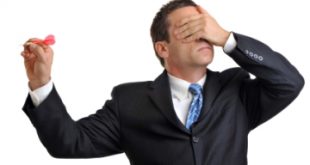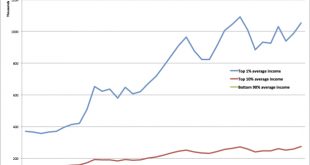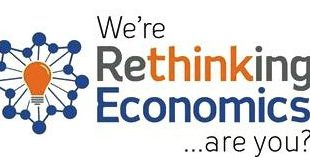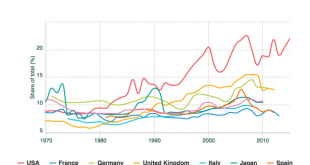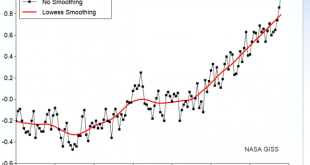from Peter Radford It is easy to be partisan. It is easy to believe in sweeping utopian solutions. It is easy to delude yourself that what you think is what everyone thinks, or, perhaps, what they ought to think. This is why I recoil from anyone offering definitive answers to complex questions. The truth is never so easily teased from reality. A healthy does of skepticism helps to keep us grounded. It seems we need that protection especially right now. Why now? Because I feel we are going...
Read More »A New Way to Make Corporations Pay Their Fair Share (w/ Dean Baker)
Subscribe to The Zero Hour with RJ Eskow for more: http://bit.ly/TheZeroHour If you liked this clip of The Zero Hour with RJ Eskow, please share it with your friends... and hit that "like" button! Some of the music bumpers featuring Lettuce, http://lettucefunk.com.
Read More »Yes — there is something really wrong with macroeconomics
from Lars Syll One way that macroeconomics stands out from other fields in economics is in how often it produces forecasts. The vast majority of empirical models in economics can be very successful at identifying causal relations or at fitting explaining behavior, but they are never used to provide unconditional forecasts, nor do people expect them to. Macroeconomists, instead, are asked to routinely produce forecasts to guide fiscal and monetary policy, and are perhaps too eager to...
Read More »Fairness and inequality
from David Ruccio Is it any surprise, as Christina Starman, Mark Sheskin, and Paul Bloom argue, that fairness is not the same thing as equality? There is immense concern about economic inequality, both among the scholarly community and in the general public, and many insist that equality is an important social goal. However, when people are asked about the ideal distribution of wealth in their country, they actually prefer unequal societies. We suggest that these two phenomena can be...
Read More »Can we avoid another financial crisis?
In 2008, conventional economics led us blindfolded into the greatest economic crisis since the Great Depression. Almost a decade later, with the global economy wallowing in low growth that they can’t explain, mainstream economists are reluctantly coming to realise that their models are useless for understanding the real world. How did mainstream economists not see the crisis coming? Was it unpredictable, as they now assert, or did their theory blind them to the real causes? Will another...
Read More »What does Trumponomics mean for developing countries?
from Jayati Ghosh Mr Trump’s policy stance will, however, mean that the United States – which has been providing less and less of a positive demand stimulus to the rest of the world economy ever since the Global Financial crisis – will continue to shrink its import demand and add to the forces that are making global trade decelerate and even decline. What does all this mean for developing countries? First, that those who are worried are right to be worried, but perhaps not for the reasons...
Read More »Firms: Who Knew?
from Peter Radford One of the controversies buried by contemporary economists in their great cause of advocating market freedoms, is that of the role of central panning. There was a time when economics accomodated controversy. Nowadays it’s arguments are securely contained within the narrow bounds of saltwater versus freshwater type spats that are little more than professional name calling inspired over minor differences of detail. Recall the capital controversy? No? How about the...
Read More »Swedish economics establishment and pluralism in economics
from Lars Syll In the latest issue of Fronesis yours truly and a couple of other academics (e.g. Julie Nelson, Tony Lawson, and Phil Mirowski) made an effort at introducing its readers to heterodox economics and its critique of mainstream economics. Rather unsurprisingly this hasn’t pleased the Swedish economics establishment. On the mainstream economics blog Ekonomistas, professor Daniel Waldenström today rode out to defend the mainstream with the nowadays standard defense — heterodox...
Read More »Why is it anyone would want to save such an economic system?
from David Ruccio One of the arguments I made in my piece on “Class and Trumponomics” (serialized on this blog—here, here, here, and here—and recently published as a single article in the Real-World Economics Review [pdf]) is that, in the United States, the class dynamic underlying the growing gap between the top 1 percent and everyone else was the much-less-remarked-upon divergence in the capital and wage shares of national income. Thus, I concluded, “the so-called recovery, just like...
Read More »A factual update on global warming
What do you get when you apply a 13 year smoothing function to the yearly data on global temperature? The graph above. According to ‘climate optimists’ the graph above is misleading, as, for one thing, these surface data are supposed to show a different pattern of development than the ‘satellite data’. The point: they don’t. The graph above shows about 0,7 to 0,8 degrees warming after 1979 and a pattern of relentless increase. The ‘satellite data’ (graph below) show 0,5 degrees warming...
Read More » Real-World Economics Review
Real-World Economics Review


